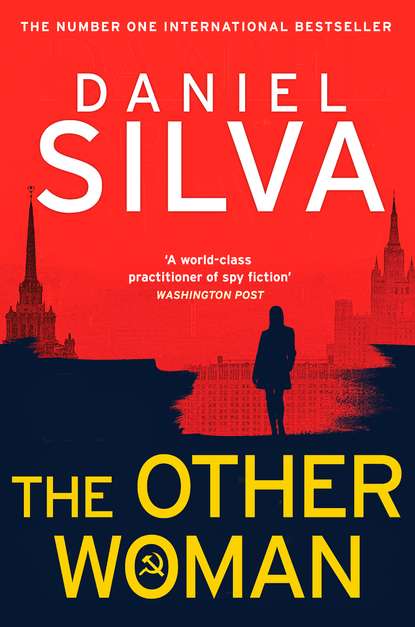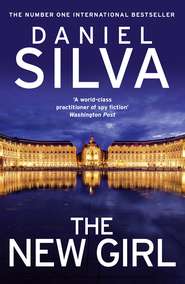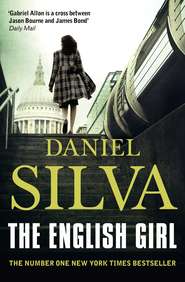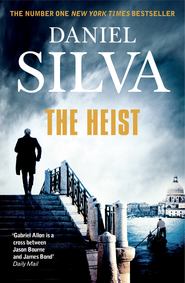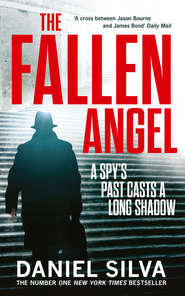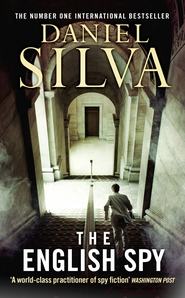По всем вопросам обращайтесь на: info@litportal.ru
(©) 2003-2024.
✖
The Other Woman
Автор
Год написания книги
2019
Настройки чтения
Размер шрифта
Высота строк
Поля
“There’s no one else on the line. And even if there was, the signal is so encrypted it would take a couple of supercomputers a month to reassemble the pieces.” The shot stabilized. “That’s more like it.”
“Let me see the lobby.”
Lavon tapped the keyboard of another computer, and a shot of the lobby appeared. It was a sea of ill-fitting clothing, name tags, and receding hairlines. Gabriel scanned the faces, looking for one that appeared to be out of place. He found four—two male, two female. Using the hotel’s cameras, Lavon captured still images of each and forwarded them to Tel Aviv. On the screen of the adjacent laptop, Konstantin Kirov was checking his phone.
“How long do you intend to make him wait?” asked Lavon.
“Long enough for King Saul Boulevard to run those faces through the database.”
“If he doesn’t leave soon, he’ll miss his train.”
“Better to miss his train than be assassinated in the lobby of the InterContinental by a Moscow Center hit team.” Once again, the shot turned to tile. Annoyed, Gabriel tapped the screen.
“Don’t bother,” said Lavon. “I’ve already tried that.”
Ten minutes elapsed before the Operations Desk at King Saul Boulevard declared that it could find no matches for the four faces in the Office’s digital rogues’ gallery of enemy intelligence officers, known or suspected terrorists, or private mercenaries. Only then did Gabriel compose a brief text message on an encrypted BlackBerry and tap the SEND key. A moment later he watched Konstantin Kirov reach for his mobile phone. After reading Gabriel’s text, the Russian rose abruptly, pulled on his overcoat, and wrapped a scarf around his neck. He slipped the mobile phone into his pocket but kept the suicide ampule in his hand. The suitcase he left behind.
Eli Lavon tapped a few keys on the laptop as Kirov opened the door of his room and went into the corridor. The hotel’s security cameras monitored his short walk to the lifts. There were no other guests or staff present, and the carriage into which the Russian stepped was empty. The lobby, however, was bedlam. No one seemed to take notice of Kirov as he made his way out of the hotel, including two leather-jacketed toughs from the Hungarian security service who were keeping watch in the street.
It was a few minutes before nine o’clock. There was time enough for Kirov to catch the night train to Vienna, but he had to keep moving. He headed south on Apáczai Csere János Street, followed by two of Eli Lavon’s watchers, and then turned onto Kossuth Lajos Street, one of central Budapest’s main thoroughfares.
“My boys say he’s clean,” said Lavon. “No Russians, no Hungarians.”
Gabriel dispatched a second message to Konstantin Kirov, instructing him to board the train as planned. He did so with four minutes to spare, accompanied by the watchers. For now, there was nothing more Gabriel and Lavon could do. As they stared at one another in silence, their thoughts were identical. The waiting. Always the waiting.
4 (#ulink_dcb48f2b-05a9-537c-bb8c-f22159a1c3c9)
WESTBAHNHOF, VIENNA (#ulink_dcb48f2b-05a9-537c-bb8c-f22159a1c3c9)
But Gabriel and Eli Lavon did not wait alone, for on that evening they had an operational partner in Her Majesty’s Secret Intelligence Service, the oldest and grandest such agency in the civilized world. Six officers from its storied Vienna Station—the exact number would soon be a matter of some contention—held a tense vigil in a locked vault at the British Embassy, and a dozen more were hovering over computers and blinking telephones at Vauxhall Cross, MI6’s riverfront headquarters in London.
A final MI6 officer, a man called Christopher Keller, waited outside Vienna’s Westbahnhof train station, behind the wheel of an unremarkable Volkswagen Passat sedan. He had bright blue eyes, sun-bleached hair, square cheekbones, and a thick chin with a notch in the center. His mouth seemed permanently fixed in an ironic smile.
Having little else to do that evening other than keep watch for any stray Russian hoods, Keller had contemplated the improbable path that had led him to this place. The wasted year at Cambridge, the deep-cover operation in Northern Ireland, the friendly-fire incident during the first Gulf War that cast him into self-imposed exile on the island of Corsica. There he had acquired perfect if Corsican-accented French. He had also performed services for a certain notable Corsican crime figure that might loosely be described as murder for hire. But all that was behind him. Thanks to Gabriel Allon, Christopher Keller was a respectable officer of Her Majesty’s Secret Intelligence Service. He was restored.
Keller looked at the Israeli in the passenger seat. He was tall and lanky, with bloodless skin and eyes the color of glacial ice. His expression was one of profound boredom. The anxious drumming of his fingers on the center console, however, betrayed the true state of his mind.
Keller lit a cigarette, his fourth in twenty minutes, and blew a cloud of smoke against the windscreen.
“Must you?” protested the Israeli.
“I’ll stop smoking when you stop drumming your damn fingers.” Keller spoke with a posh West London drawl, a remnant of a privileged childhood. “You’re giving me a headache.”
The Israeli’s fingers went still. His name was Mikhail Abramov. Like Keller, he was a veteran of an elite military unit. In Mikhail’s case, it was the IDF’s Sayeret Matkal. They had operated together several times before, most recently in Morocco, where they had tracked Saladin, the leader of ISIS’s external operations division, to a remote compound in the Middle Atlas Mountains. Neither man had fired the shot that ended Saladin’s reign of terror. Gabriel had beaten them both to the target.
“What are you so nervous about anyway?” asked Keller. “We’re in the middle of dull, boring Vienna.”
“Yes,” said Mikhail distantly. “Nothing ever happens here.”
Mikhail had lived in Moscow as a child and spoke English with a faint Russian accent. His linguistic abilities and Slavic looks had allowed him to pose as a Russian in several notable Office operations.
“You’ve operated in Vienna before?” asked Keller.
“Once or twice.” Mikhail checked his weapon, a Jericho .45-caliber pistol. “Do you remember those four Hezbollah suicide bombers who were planning to attack the Stadttempel?”
“I thought EKO Cobra handled that.” EKO Cobra was Austria’s tactical police unit. “In fact, I’m quite sure I read something about it in the newspapers.”
Mikhail stared at Keller without expression.
“That was you?”
“I had help, of course.”
“Anyone I know?”
Mikhail said nothing.
“I see.”
It was approaching midnight. The street outside the modern glass facade of the station was deserted, only a couple of taxis waiting for the last fares of the night. One would collect a Russian defector and deliver him to the Best Western hotel on the Stubenring. From there he would walk the rest of the way to the safe flat. The decision on whether to admit him would be made by Mikhail, who would be following on foot. The safe flat’s location was perhaps the most closely guarded secret of the operation. If Kirov was clean, Mikhail would search him in the building’s foyer and then take him upstairs to see Gabriel. Keller was to remain downstairs in the Passat and provide perimeter security, with what, he did not know. Alistair Hughes, MI6’s Vienna Head of Station, had expressly forbidden him to carry a weapon. Keller had a well-deserved reputation for violence; Hughes, for caution. He had a nice life in Vienna—a productive network, long lunches, decent relations with the local service. The last thing he wanted was a problem that would result in him being recalled to a desk at Vauxhall Cross.
Just then, Mikhail’s BlackBerry flared with an incoming message. The glow of the screen lit his pale face. “The train is in the station. Kirov is on his way out.”
“Heathcliff,” said Keller with reproof. “His name is Heathcliff until we get him inside the safe flat.”
“Here he comes.”
Mikhail returned his BlackBerry to his coat pocket as Kirov emerged from the station, preceded by one of Eli Lavon’s watchers and followed by another.
“He looks nervous,” said Keller.
“He is nervous.” Mikhail was drumming his fingers on the center console again. “He’s Russian.”
The watchers departed the station on foot; Konstantin Kirov, in one of the taxis. Keller followed at a discreet distance as the car moved eastward across the city along deserted streets. He saw nothing to suggest the Russian courier was being tailed. Mikhail concurred.
At twelve fifteen the taxi stopped outside the Best Western. Kirov climbed out but did not enter the hotel. Instead, he crossed the Donaukanal over the Schwedenbrücke, now trailed by Mikhail on foot. The bridge deposited the two men onto the Taborstrasse, and the Taborstrasse in turn delivered them to a pretty church square called the Karmeliterplatz, where Mikhail closed the distance between himself and his quarry to a few paces.
Together they crossed to an adjacent street and followed it past a parade of darkened shops and cafés, toward the Biedermeier apartment house at the end of the block. Light burned faintly in a fourth-floor window, enough so that Mikhail could make out the silhouetted figure of Gabriel standing with one hand to his chin and his head tilted slightly to one side. Mikhail sent him one final text. Kirov was clean.
It was then he heard the sound of an approaching motorcycle. His first thought was that it was not the sort of night to be piloting a vehicle with only two wheels. This was confirmed a few seconds later when he saw the bike skidding around the corner of the apartment block.
The driver wore black leather and a black helmet, with the dark visor down. He slid to a stop a few yards from Kirov, dropped a foot to the street, and drew a gun from the front of his jacket. It was fitted with a long cylindrical sound suppressor. Mikhail couldn’t discern the model of the weapon itself. A Glock, maybe an H&K. Whatever it was, it was pointed directly at Kirov’s face. Mikhail allowed the phone to fall from his grasp and reached for his Jericho, but before he could draw it, the motorcyclist’s weapon spat twin tongues of fire. Both shots found their mark. Mikhail heard the sickening crack of the rounds tearing through Kirov’s skull, and saw a flash of blood and brain matter as he collapsed to the street.
The man on the motorcycle then swung his arm a few degrees and leveled the gun at Mikhail. Two shots, both errant, drove him to the pavement, and two more sent him crawling toward the shelter of a parked car. His right hand had found the grip of the Jericho. As he drew it, the man on the motorcycle raised his foot and revved the engine.
He was thirty meters from Mikhail, no more, with the ground floor of the apartment block behind him. Mikhail had both hands on the Jericho, with his outstretched arms braced on the boot of the parked car. Still, he held his fire. Office doctrine gave field operatives wide latitude in utilizing deadly force to protect their own lives. It did not, however, allow an operative to fire a .45-caliber weapon toward a fleeing target in a residential quarter of a European city, where a stray round might easily take an innocent life.
The motorcycle was now in motion, the roar of its engine reverberating in the canyon of apartment buildings. Mikhail watched its progress over the barrel of the Jericho until it was gone. Then he clambered over to the spot where Kirov had fallen. The Russian was gone, too. There was almost nothing left of his face.





